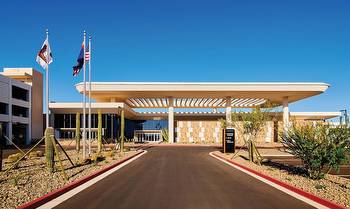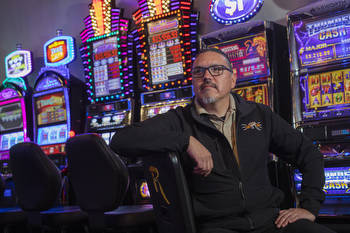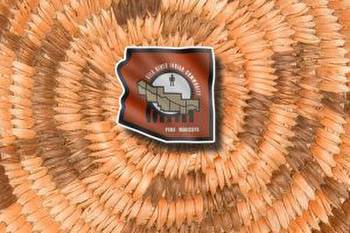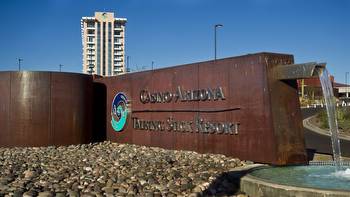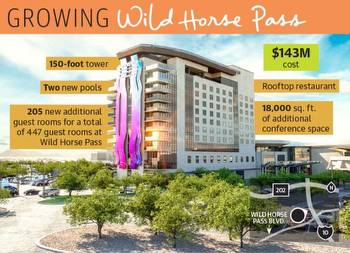New Arizona gaming compacts with tribes to bring more casinos, slots
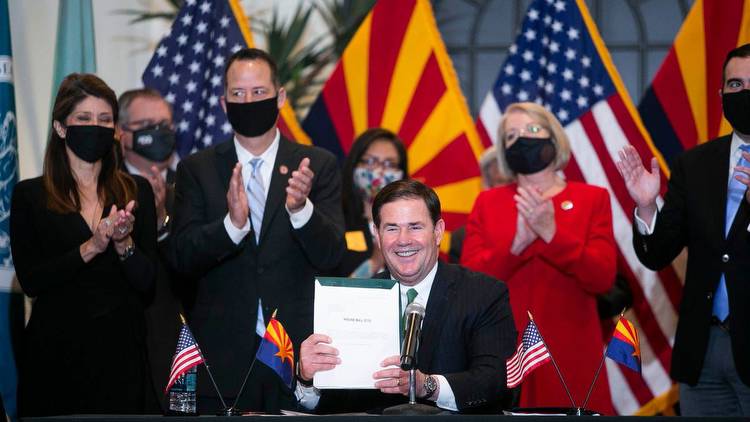
Gov. Doug Ducey on Thursday signed historic agreements with Native American tribes in Arizona that mark the most significant update to gambling in the state in decades.
Ducey and a host of tribal leaders held a ceremonial document signing at the Heard Museum in Phoenix for the compacts, as well as a bill to allow sports betting that was tied to the casino deal.
Ducey cheerfully signed the documents, surrounded by dozens of tribal and sports franchise representatives, state lawmakers, lobbyists, lawyers and others who worked on the deal.
The amended gaming compact allows casino expansions that will allow tribes to operate thousands more slot machines, open at least four new casinos and take bets on new table games.
At least two new casinos will be in metro Phoenix, one on the Gila River Indian Community's land south of Phoenix, and the other on the southeast corner of Loop 303 and Northern Parkway to be built by the Tohono O'odham Nation, which already operates the Desert Diamond Casino near Glendale.
The Governor's Office said the new Gila River facility, the tribe's fourth, would locate on the reservation and not on some parcel of land within a Valley city that the tribe has put in trust to become part of a reservation. That happened with Desert Diamond.
The compact amendments allow for updates after 10 years.
"Arizona’s gaming compact has been updated multiple times, but this represents the most significant changes in almost two decades — a truly historic event," Ducey said at the ceremony.
"Don't let anyone tell you that getting here was easy," Ducey said of the negotiations that were ongoing for five years.
The deals will let tribes add new games like craps, baccarat, roulette, pai gao and sic bo, as well as allow them to operate about 6,300 more slots than they already are allowed to have at their casinos. Arizona's tribes offer only card games like blackjack and poker now, plus keno and bingo.
The compact amendment also gives tribes the right to add about 550 more slots statewide every two years.
The compacts need to be signed by the U.S. secretary of the Interior and posted to the Federal Register before they become effective. That could take a couple of months.
The tribes operate more than 13,000 slots today, according to the latest status report from the Arizona Department of Gaming.
Also in the deal is an additional casino for the Navajo Nation off Highway 89 north of Flagstaff in land to be put in trust for the tribe, and another casino for the Pascua Yaqui Tribe south of West Grant Road and east of Interstate 10 in Tucson.
The amendments to the tribal gaming compacts were tied to a sports-betting law that Arizona lawmakers approved Monday. That new law allows tribes and professional sports organizations to open 20 sportsbooks in Arizona.
Those sportsbooks could be ready by late August or September, according to the lawmakers who sponsored the measure.
Already, the PGA Tour has announced plans for a sportsbook at the TPC Scottsdale golf course that will be open year-round, pending regulatory approval. And the Phoenix Suns on Thursday announced plans for a sportsbook in their arena in partnership with FanDuel Group, which also will be open year-round for gambling.
Ducey said the changes will uphold the "limited, well-regulated gaming culture in our state."
Tribes plan casino expansions
Arizona's Native American tribes historically have opposed any gambling off reservations, but they agreed to support the sportsbook law in exchange for expansions in their casino deals.
"We argued before we agreed, and we fought before we found our middle ground," said Stephen Roe Lewis, governor of the Gila River Indian Community, who thanked Ducey profusely for his work to reach a deal.
Lewis said the tribe doesn't yet know where its fourth casino will open, or when.
"This is something that has to be definitely studied," he said after the signing ceremony. "We want to grow the market, but we want to grow it responsibly."
Navajo Nation President Jonathan Nez likewise said his tribe is studying where best to build its next casino, saying the tribe wasn't locked into the site on Highway 89 north of Flagstaff.
He said the tribe wants to build in a place that is busy, and is communicating with the Interior Department about putting land in trust, but that the location is not solidified.
"We don't want to compete with other facilities," he said.
The Navajo and Hopi tribes lost a major source of revenue two years ago when the Navajo Generating Station coal-fired power plant near Page and the Kayenta Mine that straddled the two reservations closed. The coal facilities generated significant revenue for the tribes.
"With the closing of NGS and the Peabody mine, tribes do need new money coming into their coffers," Nez said.
"It's about self-sufficiency and self-reliance," Nez said of the compacts.
What's in the new compacts
Sixteen tribes run 25 casinos in Arizona, according to the Department of Gaming, and another six have slot machine rights they can lease to other tribes. Tribes pay 1% to 8% of their gambling revenue to state and local governments.
In the last fiscal year, which ended in June, Arizona's tribal casinos contributed $102 million to the state and another $14 million to cities, towns and counties, according to the Department of Gaming.
The amended compacts are expected to increase both the tribal revenue and contributions to the state and municipalities.
The compact update will allow the smallest tribes to reduce their contributions to the state from 1% to 0.75%, though officials in the Governor's Office said the expanded casinos will more than make up for that change in state revenue collections.
There also are two more casinos that possibly could come to the Phoenix area for the Fort McDowell Yavapai Nation and Salt River Pima-Maricopa Indian Community, but the Governor's Office said neither tribe plans a new facility and they only wanted the rights to build should that change in the future.
That is also the case with other rural tribes that have rights to build new casinos that don't exist today, with the Governor's Office saying maintaining those rights was important to the tribes but that new properties are not expected.
The new compact provides for 55 properties, 11 more than the old compacts, but the Governor's Office only expects four to come to fruition.
The last change to the tribal compacts came in 2002 when voters approved Proposition 202, which was at the time the most expensive ballot-measure fight in state history (a clean-energy measure in 2018 topped it).
The 2002 ballot measure established a new framework for tribal casinos in the state, but those agreements will expire in the next few years, so Ducey took the opportunity to renegotiate them before he leaves office next year.








